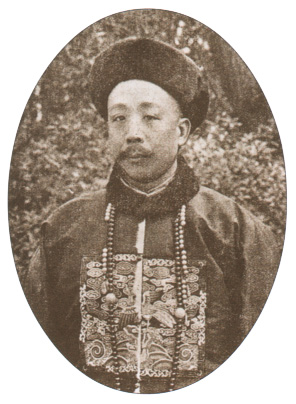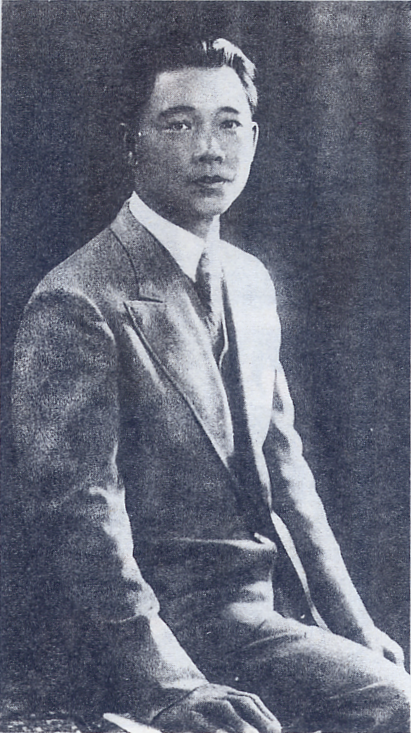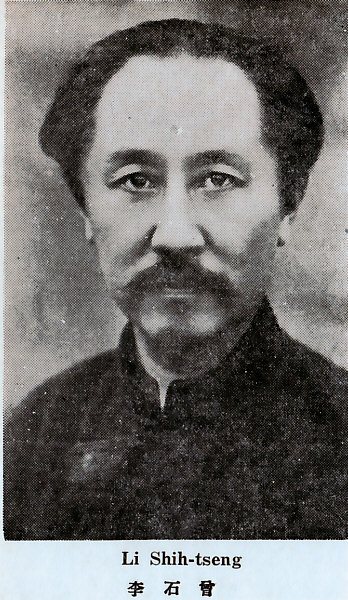|
Tongmenghui
The Tongmenghui of China was a secret society and underground resistance movement founded by Sun Yat-sen, Song Jiaoren, and others in Tokyo, Empire of Japan, on 20 August 1905, with the goal of overthrowing China's Qing dynasty. It was formed from the merger of multiple late-Qing dynasty Chinese revolutionary groups. History Revolutionary era The Tongmenghui was created through the unification of Sun Yat-sen's Xingzhonghui (Revive China Society), the Guangfuhui (Restoration Society) and many other Chinese revolutionary groups. Among the Tongmenghui's members were Huang Xing, Li Zongren, Zhang Binglin, Chen Tianhua, Wang Jingwei, Hu Hanmin, Tao Chengzhang, Cai Yuanpei, Li Shizeng, Zhang Renjie, and Qiu Jin. In 1906, a branch of the Tongmenghui was formed in Singapore Singapore, officially the Republic of Singapore, is an island country and city-state in Southeast Asia. The country's territory comprises one main island, 63 satellite islands and islets ... [...More Info...] [...Related Items...] OR: [Wikipedia] [Google] [Baidu] |
Advisory Council (Qing Dynasty)
The Advisory Council (), also known as the Government Advisory Council, Political Advisory Council, or Political Advisory Board, was a preparatory body for the parliament established in 1910. It was part of the New Policies in the late Qing dynasty, of which the Qing court was moving toward the Preparative Constitutionalism, implementation of a constitution. In September 1907, the Guangxu Emperor promulgated a decree on the setting up of the Advisory Council, following by the provincial Consultative Bureaus in October. The Advisory Council was established on 6 November 1906, and formally opened on 10 October 1910, after the first 1909 Chinese parliamentary election, parliamentary election in last October. The council was dissolved on 12 February 1912 along with the end of the Qing dynasty, and was replaced by the Provisional Senate of the Republic of China (1912-49), Republic of China. History After the Boxer Protocol was signed in 1901, the Qing court returned to its capital ... [...More Info...] [...Related Items...] OR: [Wikipedia] [Google] [Baidu] |
Sun Yat-sen
Sun Yat-senUsually known as Sun Zhongshan () in Chinese; also known by Names of Sun Yat-sen, several other names. (; 12 November 186612 March 1925) was a Chinese physician, revolutionary, statesman, and political philosopher who founded the Republic of China (ROC) and its first political party, the Kuomintang (KMT). As the paramount leader of the 1911 Revolution, Sun is credited with overthrowing the Qing dynasty, Qing imperial dynasty and served as the first president of the Provisional Government of the Republic of China (1912), Provisional Government of the Republic of China (1912) and as the inaugural Chairman of the Kuomintang, leader of the Kuomintang. Born to a peasant family in Guangdong, Sun was educated overseas in Hawaiian Kingdom, Hawaii and returned to China to graduate from medical school in British Hong Kong, Hong Kong. He led underground anti-Qing revolutionaries in South China, the United Kingdom of Great Britain and Ireland, United Kingdom, and Empire of Japan, Ja ... [...More Info...] [...Related Items...] OR: [Wikipedia] [Google] [Baidu] |
Huang Xing
Huang Xing or Huang Hsing (; 25 October 1874 – 31 October 1916) was a Chinese revolutionary leader and politician, and the first commander-in-chief of the Republic of China. As one of the founders of the Kuomintang (KMT) and the Republic of China, his position was second only to Sun Yat-sen. Together they were known as Sun-Huang during the Xinhai Revolution. He was also known as the "Eight Fingered General" because of wounds sustained during war. His tomb is on Mount Yuelu, in Changsha, Hunan, China. Huang was born in the village of Gaotang, now part of Changsha, Hunan. Like many other Chinese men born before 1949, Huang was known by many different names during his life. His birth name was "Huang Zhen", but this was later changed to "Huang Xing". He was also known as "Huang Keqiang" and "Qing Wu". In the period after 1911 he also used the names "Li Youqing" and "Zhang Shouzheng". Biography Early life Huang Xing was a descendant of Huang Tingjian, a Chinese artist, schola ... [...More Info...] [...Related Items...] OR: [Wikipedia] [Google] [Baidu] |
Kuomintang
The Kuomintang (KMT) is a major political party in the Republic of China (Taiwan). It was the one party state, sole ruling party of the country Republic of China (1912-1949), during its rule from 1927 to 1949 in Mainland China until Retreat of the government of the Republic of China to Taiwan, its relocation to Taiwan, and in Taiwan Martial law in Taiwan, ruled under martial law until 1987. The KMT is a Centre-right politics, centre-right to Right-wing politics, right-wing party and the largest in the Pan-Blue Coalition, one of the two main political groups in Taiwan. Its primary rival is the Democratic Progressive Party (DPP), the largest party in the Pan-Green Coalition. As of 2025, the KMT is the largest single party in the Legislative Yuan and is chaired by Eric Chu. The party was founded by Sun Yat-sen in 1894 in Honolulu, Hawaii, as the Revive China Society. He reformed the party in 1919 in the Shanghai French Concession under its current name. From 1926 to 1928, the K ... [...More Info...] [...Related Items...] OR: [Wikipedia] [Google] [Baidu] |
Wang Jingwei
Wang Zhaoming (4 May 188310 November 1944), widely known by his pen name Wang Jingwei, was a Chinese politician who was president of the Reorganized National Government of the Republic of China, a puppet state of the Empire of Japan. He was initially a member of the Socialist ideology of the Kuomintang, left wing of the Kuomintang (KMT), leading a Government of the Republic of China in Wuhan, government in Wuhan in opposition to the right-wing Nationalist government in Nanjing, but later became increasingly anti-communist after his efforts to collaborate with the Chinese Communist Party ended in political failure. Wang was a close associate of Sun Yat-sen for the last twenty years of Sun's life. After Sun's death in 1925, Wang engaged in a political struggle with Chiang Kai-shek for control over the Kuomintang, but lost. Wang remained inside the Kuomintang, but continued to have disagreements with Chiang. Following the outbreak of the Second Sino-Japanese War in 1937, Wang acce ... [...More Info...] [...Related Items...] OR: [Wikipedia] [Google] [Baidu] |
Huaxinghui
The Huaxinghui (), commonly translated as the China Revival Society or China Arise Society, was founded by Huang Xing and Zhang Shizhao on 15 February 1904 with the election of Huang Xing as its president, in Changsha of Hunan for the explicit political goal of overthrowing the Qing dynasty and establishing a democratic and free country. Many of its members later became key figures of the Tongmenghui. Background In 1903, Russian Empire made seven requests to the Qing Dynasty in an attempt to invade and occupy Northeast China. This action shook Japan. The ''Asahi Shimbun'' first published this news, and the Chinese students studying in Japan held a student conference at the Kinkikwan () in Tokyo. In early June, Huang Xing returned to China from Japan as an "athlete" of the Army and National Education Association () and planned new actions in Hunan and Hubei. On November 4, 1903, in the name of celebrating his 30th birthday, Huang Xing invited Liu Kuiyi (), Song Jiaoren, Z ... [...More Info...] [...Related Items...] OR: [Wikipedia] [Google] [Baidu] |
Song Jiaoren
Song Jiaoren (, ; Chinese name, Given name at birth: Liàn 鍊; Courtesy name: Dùnchū 鈍初; 5 April 1882 – 22 March 1913) was a Republic of China (1912–1949), Chinese republican revolutionary, political leader and a founder of the Kuomintang (KMT). Song Jiaoren led the KMT to electoral victories in China's 1912 Republic of China National Assembly election, first democratic election. He based his appeal on the upper class gentry, landowners, and merchants. Historians have concluded that President of the Republic of China, provisional president, Yuan Shikai, was responsible for his assassination on 22 March 1913. Early life Song Jiaoren was born and educated in Hunan. When he was six years old, Song Jiaoren began his education at a private school. When Song was seventeen years old, he graduated and began enrollment at Taoyuan County, Hunan, Taoyuan Zhangjiang College. The influence of his teachers, Huang Shouyi and Qu Fangmei, caused Song to make no effort to pursue th ... [...More Info...] [...Related Items...] OR: [Wikipedia] [Google] [Baidu] |
Anarchism In China
Anarchism in China was a strong intellectual force in the reform and revolutionary movements in the early 20th century. In the years before and just after the overthrow of the Qing dynasty Chinese anarchists insisted that a true revolution could not be political, replacing one government with another, but had to overthrow traditional culture and create new social practices, especially in the family. "Anarchism" was translated into Chinese as () literally, "the doctrine of no government." Chinese students in Japan and France eagerly sought out anarchist doctrines to first understand their home country and then to change it. These groups relied on education to create a culture in which strong government would not be needed because men and women were humane in their relations with each other in the family and in society. Groups in Paris and Tokyo published journals and translations that were eagerly read in China and the Paris group organized the Work-Study Programs to bring stude ... [...More Info...] [...Related Items...] OR: [Wikipedia] [Google] [Baidu] |
Zhang Renjie
Zhang Renjie (; 19 September 1877 − 3 September 1950), born Zhang Jingjiang, was a political figure and financial entrepreneur in the Republic of China. He studied and worked in France in the early 1900s, where he became an early Chinese anarchist under the influence of Li Shizeng and Wu Zhihui, his lifelong friends. He became wealthy trading Chinese artworks in the West and investing on the Shanghai stock exchange. Zhang gave generous financial support to Sun Yat-sen and was an early patron of Chiang Kai-shek. In the 1920s, he, Li, Wu and the educator Cai Yuanpei were known as the fiercely anti-Communist Four Elders of the Chinese Nationalist Party. Early years Zhang was born September 13, 1877, in Wuxing, Zhejiang, but his family's ancestral home was Nanxun, Zhejiang Province, where his grandfather was a prosperous salt and silk merchant. Zhang's father, Zhang Baoshan (张宝善, 1856–1926), developed the family business, and married into a family of Shanghai silk c ... [...More Info...] [...Related Items...] OR: [Wikipedia] [Google] [Baidu] |
Revive China Society
The Revive China Society (), also known as the Society for Regenerating China or the Proper China Society was founded by Sun Yat-sen on 24 November 1894 to forward the goal of establishing prosperity for China and as a platform for future 1911 Revolution, revolutionary activities, as well as the first major modern revolutionary group in Chinese history. It was formed during the First Sino-Japanese War, after a string of Chinese military defeats exposed corruption and incompetence within the imperial government of the Qing dynasty. The Revive China Society went through several political re-organizations in later years and eventually became the party known as the Kuomintang. As such, the contemporary Kuomintang considers its founding date to be the establishment of the Revive China Society. Development and Decline Because Sun was in exile from China at the time, the Revive China Society was founded in Honolulu, Republic of Hawaii. It was the first Chinese nationalism, Chines ... [...More Info...] [...Related Items...] OR: [Wikipedia] [Google] [Baidu] |
Socialist Ideology Of The Kuomintang
The historical Kuomintang socialist ideology is a form of socialist thought developed in mainland China during the early Republic of China. The Tongmenghui revolutionary organization led by Sun Yat-sen was the first to promote socialism in China. Organizations The Tongmenghui and its successor, the Kuomintang, were one of the first political groups to develop socialist ideology in China. History One of the Three Principles of the People of the Kuomintang, Minsheng, was defined as the People's Livelihood by Sun Yat-sen. The concept may be understood as social welfare as well. Sun understood it as an industrial economy and equality of land holdings for the Chinese peasant farmers. Here he was influenced by the American thinker Henry George (see Georgism) and British thinker Bertrand Russell; the land value tax in Taiwan is a legacy thereof. He divided livelihood into four areas: food, clothing, housing, and transportation; and planned out how an ideal Chinese government ... [...More Info...] [...Related Items...] OR: [Wikipedia] [Google] [Baidu] |
Li Shizeng
Li Shizeng ( zh, t=李石曾, w=Li3 Shih2-tseng1, p=Lǐ Shízēng; 29 May 1881 – 30 September 1973), born Li Yuying, was an educator, promoter of anarchist doctrines, political activist, and member of the Chinese Nationalist Party in early Republican China. After coming to Paris in 1902, Li took a graduate degree in chemistry and biology, and then along with Wu Zhihui and Zhang Renjie, cofounded the Chinese anarchist movement. He was a supporter of Sun Yat-sen. He organized cultural exchange between France and China, established the first factory in Europe to manufacture and sell beancurd, and created Diligent Work-Frugal Study programs which brought Chinese students to France for work in factories. In the 1920s, Li, Zhang, Wu, and Cai Yuanpei were known as the anti-communist "Four Elders" of the Chinese Nationalist Party. Youth and early career Though his family was from Gaoyang County, Zhili, Li was brought up in Beijing. His father was Li Hongzao. Li studied foreign ... [...More Info...] [...Related Items...] OR: [Wikipedia] [Google] [Baidu] |






